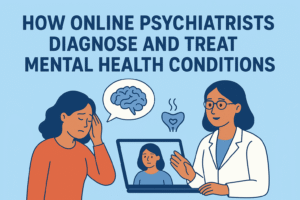In the digital age, mental health care has become more accessible and personalized than ever before. Thanks to the rise of online psychiatrists, individuals struggling with anxiety, depression, ADHD, or other psychological concerns can now seek professional help without leaving home. This transformation in psychiatric care not only removes geographical barriers but also allows patients to receive consistent, high-quality treatment that fits seamlessly into their daily lives.
This article explores how online psychiatrists diagnose and treat mental health conditions, what tools they use, and why this modern approach to mental wellness has become increasingly popular.
The Rise of Online Psychiatry: A Modern Solution to Mental Health Challenges
Over the past decade, telehealth services have expanded rapidly and psychiatry is no exception. The concept of meeting with a psychiatrist online may have seemed unconventional a few years ago, but today it’s a trusted and effective method for providing mental health support.
The global pandemic accelerated this shift, as millions turned to virtual platforms for therapy and psychiatric consultations. Online psychiatrists use secure video conferencing tools and digital communication methods to assess, diagnose, and treat a wide range of mental health conditions.
What once required long commutes, waiting rooms, and scheduling challenges is now available from the comfort of one’s home. This convenience has opened the door for more people to seek help including those who may have avoided traditional, in-person sessions due to stigma or time constraints.
What Does an Online Psychiatrist Do?
An online psychiatrist is a licensed medical doctor specializing in diagnosing and treating mental health disorders through virtual consultations. Like their in-person counterparts, they can evaluate symptoms, prescribe medications, and provide therapeutic guidance.
The key difference lies in how these services are delivered. Rather than visiting a clinic, patients connect via secure telehealth platforms. This model allows psychiatrists to offer flexibility while maintaining professional and ethical standards of care.
Some of the conditions commonly treated by online psychiatrists include:
- Anxiety disorders
- Depression
- Bipolar disorder
- ADHD
- PTSD
- Panic attacks
- Obsessive-compulsive disorder (OCD)
- Sleep-related issues
Online psychiatrists are trained to recognize subtle behavioral and emotional patterns, even through a screen, using structured interviews, psychological tests, and clinical experience.
The Diagnostic Process: How Online Psychiatrists Identify Mental Health Conditions
Diagnosis is the cornerstone of effective treatment. Understanding how an online psychiatrist performs this process helps patients feel more confident about the quality of care they’re receiving.
1. Initial Assessment and Medical History
The first consultation typically involves a detailed discussion of the patient’s mental and physical health history. The psychiatrist asks about symptoms, duration, lifestyle habits, family history, and previous treatments (if any).
This stage is crucial because many mental health disorders share overlapping symptoms. A thorough evaluation helps rule out physical illnesses or medication side effects that might mimic psychiatric symptoms.
2. Standardized Screening Tools and Questionnaires
Online psychiatrists often use digital screening tools such as the PHQ-9 (for depression) or GAD-7 (for anxiety). These standardized assessments provide measurable insights into symptom severity and progression over time.
Such tools also help psychiatrists track treatment effectiveness in future sessions.
3. Observation and Behavioral Cues
Although online consultations are virtual, psychiatrists are trained to pick up on nonverbal cues, facial expressions, tone of voice, and even body language. These subtle details can provide critical information about emotional state and cognitive functioning.
4. Differential Diagnosis
Once the psychiatrist gathers sufficient information, they compare possible conditions to identify the most accurate diagnosis. For example, they may differentiate between generalized anxiety disorder and panic disorder, or between ADHD and depression-related concentration issues.
Treatment Approaches Used by Online Psychiatrists
After establishing a diagnosis, an online psychiatrist develops a personalized treatment plan. This typically includes a combination of medication management, psychotherapy, and lifestyle recommendations.
1. Medication Management
Psychiatrists are medical doctors, so they can prescribe medications when necessary. Through virtual appointments, they monitor side effects, dosage adjustments, and overall progress.
Online prescription systems are secure and regulated, ensuring that patients receive the right medication through approved pharmacies. Commonly prescribed medications may include antidepressants, mood stabilizers, or anti-anxiety drugs.
2. Psychotherapy and Counseling
While psychiatrists primarily focus on medication, many also provide talk therapy or collaborate with licensed therapists. Sessions may involve cognitive behavioral therapy (CBT), dialectical behavior therapy (DBT), or other evidence-based approaches.
Therapeutic conversations help patients recognize thought patterns, manage stress, and develop coping strategies essential components for long-term recovery.
3. Lifestyle and Holistic Support
Online psychiatrists often encourage healthy lifestyle changes such as improved sleep routines, regular physical activity, and mindfulness practices. These holistic interventions can significantly enhance the effectiveness of medication and therapy.
4. Follow-Up and Progress Monitoring
Mental health treatment is a journey, not a one-time event. Regular follow-ups allow the psychiatrist to adjust treatment plans, address emerging symptoms, and ensure that the patient remains stable and supported.
The Benefits of Seeing an Online Psychiatrist
The shift to online mental health care has revolutionized accessibility and comfort. Some of the most notable benefits include:
1. Accessibility and Convenience
Patients can connect with their psychiatrist from home, work, or even while traveling. This flexibility is particularly beneficial for individuals living in rural or underserved areas where mental health professionals are scarce.
2. Continuity of Care
Because appointments are easier to schedule, patients are less likely to skip sessions. This leads to consistent treatment and improved outcomes.
3. Privacy and Reduced Stigma
Many people hesitate to seek help due to societal stigma. Online sessions provide privacy and discretion, making it easier to take that first step toward healing.
4. Cost-Effectiveness
Virtual consultations often reduce travel expenses and missed work hours. Many platforms also offer competitive pricing compared to traditional clinic visits.
5. Personalized and Patient-Centered Care
Online psychiatrists tailor treatment plans to individual needs, using technology to monitor progress and adjust strategies efficiently.
How Secure and Confidential Are Online Psychiatry Sessions?
Security is a major concern for anyone sharing sensitive mental health information online. Fortunately, telepsychiatry platforms adhere to strict privacy regulations such as HIPAA (in the U.S.) or equivalent data protection laws in other countries.
All communications are encrypted, ensuring that personal and medical details remain confidential. Patients can safely discuss their emotions, experiences, and struggles without worrying about data breaches.
When Should You See an Online Psychiatrist?
You don’t need to wait until symptoms become overwhelming to seek help. Consider consulting an online psychiatrist if you experience:
- Persistent sadness, anxiety, or irritability
- Difficulty concentrating or sleeping
- Extreme mood swings
- Loss of interest in daily activities
- Overwhelming stress or burnout
- Thoughts of self-harm
Early intervention can prevent conditions from worsening and lead to faster, more effective recovery.
Online Psychiatry vs. In-Person Care: Which Is Better?
Both approaches have their merits, and the best choice depends on the individual. Online psychiatry offers unmatched convenience, while in-person care may be ideal for cases requiring physical evaluations or emergency intervention.
In most situations, online psychiatrists can provide the same level of diagnostic accuracy and treatment effectiveness as traditional psychiatrists. For many, the virtual format enhances comfort, engagement, and consistency.
Platforms like Hellodoc are at the forefront of this transformation, offering trusted, professional, and confidential online psychiatric services tailored to individual needs. As awareness grows and digital tools evolve, the future of mental health care looks more connected, inclusive, and hopeful than ever.
Final Thoughts:
The integration of technology into psychiatric care has redefined how people access mental health support. With the help of experienced online psychiatrists, individuals can receive expert diagnoses, personalized treatment, and compassionate guidance all from the comfort of home.



